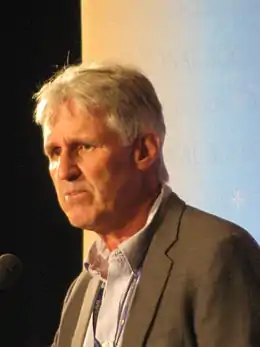Ian Morris (historien)
Ian Matthew Morris (né le à Stoke-on-Trent, Staffordshire, Angleterre) est un historien et archéologue britannique, en poste aux États-Unis, spécialiste de l'histoire du bassin méditerranéen. Il a également produit un ouvrage d'histoire globale.

| Naissance | |
|---|---|
| Nom dans la langue maternelle |
Ian Matthew Morris |
| Nationalité |
britannique |
| Formation |
Université de Birmingham (baccalauréat universitaire) (jusqu'à ) Université de Cambridge (doctorat) (jusqu'en ) Alleyne's High School (en) |
| Activités |
Anthropologue, professeur d'université, universitaire, historien, historien de l’art, archéologue, érudit classique |
| A travaillé pour | |
|---|---|
| Chaire |
Jean and Rebecca Willard Endowed Professorship in Classics (d) |
| Membre de |
American Anthropological Association Social Science History Association (en) British Academy Institut archéologique américain Société américaine d'histoire Society for Classical Studies (en) Society of Antiquaries of London |
| Site web | |
| Distinction |
Formation
Ian Morris étudie l'histoire et l'archéologie à l'université de Birmingham (Angleterre) et obtient en 1985 son doctorat (PhD) à l'université de Cambridge (Angleterre)[1], avec une thèse intitulée : « Inhumation et société à Athènes, 1100 - »[2].
Carrière
Ian Morris enseigne de 1987 à 1995 à l'université de Chicago, et depuis à l'université Stanford, aux États-Unis[1].
Travaux
De 2000 à 2006, Ian Morris a dirigé pour l'université Stanford les fouilles archéologiques du Monte Polizzo, en Sicile[3].
Ian Morris a publié de nombreux ouvrages sur l'histoire et l'archéologie de la Méditerranée.
Son livre phare, paru en 2010, Why the West Rules--For Now ("Pourquoi l'Ouest règne — jusqu’à maintenant") compare Europe et Asie pendant les 15 000 dernières années, en défendant la thèse que la géographie physique, plus que la culture, la religion, la politique, la génétique, ou les grands hommes explique la domination occidentale du monde, dans la veine des thèses de l'américain Jared Diamond. The Economist[4] indique que « c’est un livre important qui défie, stimule et divertit. Toute personne ne croyant pas que l'on puisse apprendre de l'histoire devrait commencer par ce livre. ».
Publications
Ouvrages
- (en) Burial and Ancient Society : the Rise of the Greek City-State, Cambridge/New-York/Melbourne, Cambridge University Press, , 262 p. (ISBN 0-521-32680-X)
- (en) Death-Ritual and Social Structure in Classical Antiquity, Cambridge, Cambridge University Press, , 264 p. (ISBN 0-521-37465-0)
- (en) Classical Greece : Ancient Histories and Modern Archeologies, Cambridge, Cambridge University Press, , 244 p. (ISBN 0-521-39279-9) (éditeur)
- Archaeology as Cultural History : Words and Things in Iron Age Greece, Blackwell, , 358 p. (ISBN 978-0-631-19602-0)
- The Greeks : History, Culture and Society, Prentice Hall, 2005 (2e ed. 2009), 534 p. (ISBN 978-0-13-921156-0) (avec Barry Powell)
- (en) Why the West Rules : For Now : The Patterns of History, and What they Reveal About the Future, New York, Farrar, Straus and Giroux, , 768 p. (ISBN 978-0-374-29002-3)
- Pourquoi l'Occident domine le monde...pour l'instant [« Why the West Rules - For Now:The Patterns of History, and What they Reveal About the Future »] (trad. de l'anglais), Paris, L'Arche, , 768 p. (ISBN 978-2-85181-748-8, présentation en ligne)
- (en) The Measure of Civilisation : How Social Development Decides the Fate of Nations, Princeton, Princeton University Press, , 400 p. (ISBN 978-0-691-15568-5, lire en ligne)
- (en) War! What is it Good For? : Conflict and the Progress of Civilization from Primates to Robots, New York, Farrar, Straus and Giroux, , 512 p. (ISBN 978-0-374-28600-2)
- Foragers, Farmers and Fossil Fuels : How Human Values Evolve, Princeton University Press, , 400 p. (ISBN 978-1-4008-6551-2, lire en ligne) (Tanner Lecture donnée à l'université de Princeton, avec des commentaires de Margaret Atwood, Christine Korsgaard, Richard Seaford et Jonathan Spence)
Direction d'ouvrages
- (en) A New Companion to Homer, Leiden, Brill, , 755 p. (ISBN 90-04-09989-1, lire en ligne) (coéditeur avec Barry Powell)
- Democracy 2500? : Questions and Challenges, Kendall-Hunt, , 281 p. (ISBN 978-0-7872-4466-8) (coéditeur avec Kurt Raaflaub)
- (en) The Ancient Economy : Evidence and Models, Stanford (Calif.), Stanford University Press, , 285 p. (ISBN 0-8047-4805-5) (coéditeur avec Joe Manning)
- (en) Cambridge Economic History of the Greco-Roman World, Cambridge, Cambridge University Press, , 942 p. (ISBN 978-0-521-78053-7, lire en ligne) (coéditeur avec Walter Scheidel et Richard Saller)
- (en) Dynamics of Ancient Empires : State Power from Assyria to Byzantium, Oxford/New York, Oxford University Press, , 381 p. (ISBN 978-0-19-537158-1, lire en ligne) (coéditeur avec Walter Scheidel)
Références
- (en) Ian Morris, Stanford History Department
- (en) Ian M. Morris, « Burial and society at Athens, 1100-500 BC », sur E-Thesis Online Service, The British Library Board, (DOI 10.17863/CAM.20100, consulté le )
- (en) Classics and History Expert - Ian Morris, Stanford University
- (en) Global power: On top of the world. The Economist.
Voir aussi
Liens externes
- (en) Ian Morris, Stanford University
- (en) Classics and History Expert - Ian Morris, Stanford University
- (en) Why the West Rules for Now: , Interview de Ian Morris dans www.theglobaldispatches.com
- (en) Interview de Ian Morris, UC Berkeley
- (en) 'War! What Is It Good For?' by Ian Morris April 11, 2014 Wall Street Journal Book Review by Felipe Fernandez-Armesto
- Site officiel
- Ressource relative à la recherche :